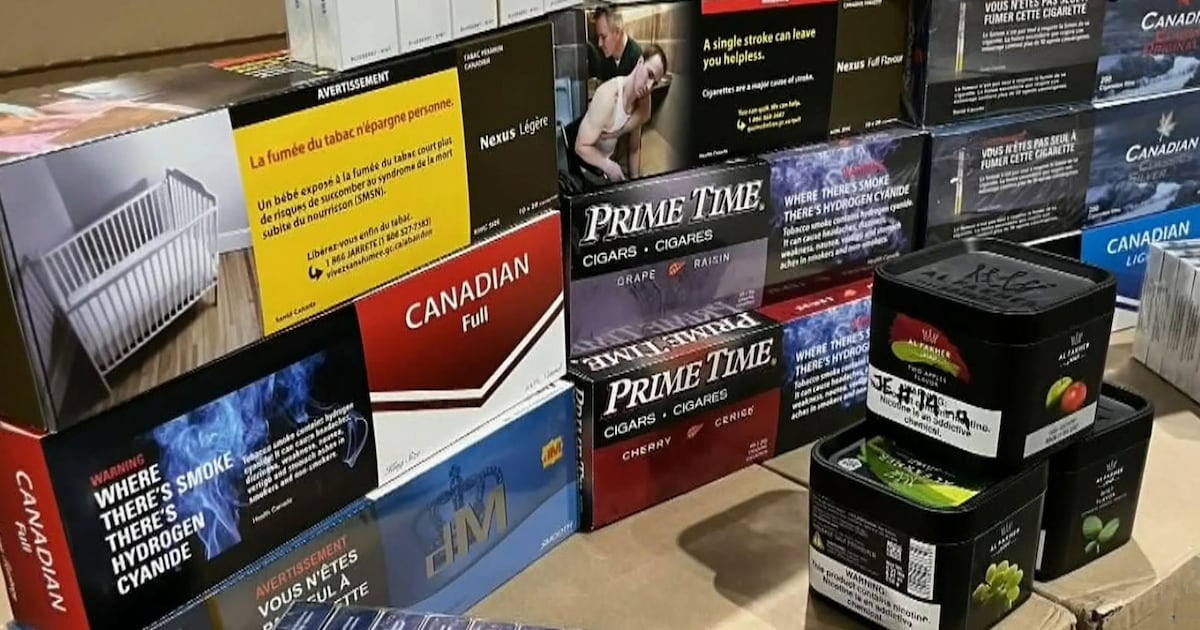Top Stories
Illegal Cigarette Trade Soars in Western Canada, Police Crackdown Intensifies

UPDATE: The illegal cigarette industry in western Canada is surging, prompting law enforcement to escalate efforts against this billion-dollar trade linked to organized crime. Authorities report a dramatic increase in illegal tobacco sales, with a carton of contraband cigarettes costing just $40 compared to approximately $150 for legal brands, making it an attractive option for consumers seeking savings.
Rick Barnum, executive director of the National Coalition Against Contraband Tobacco, states that rising taxes on legal cigarettes are driving more buyers to the black market. “Governments are inadvertently fueling this trade,” Barnum explains. “There’s insufficient action to counter this growing issue.”
With police agencies like the Alberta RCMP reporting significant challenges, the impact of illegal tobacco sales is profound. Barnum warns that purchasing contraband cigarettes directly supports organized crime, which is thriving with at least 150 organized crime groups involved in the distribution of these products.
The societal implications are stark. Barnum highlights that tax revenue from legal tobacco sales is critical for funding essential services, including schools and healthcare. “The illicit sale undermines our communities,” says Troy Savinkoff of Alberta RCMP. “This issue is not just about cigarettes; it’s about funding our roads and hospitals.”
As law enforcement ramps up seizures, the numbers are alarming. In the fiscal year 2024-25, authorities confiscated approximately 240,000 cartons of illegal tobacco, a significant increase from 18,000 cartons in 2020-21. Despite these efforts, organized crime remains resilient. Savinkoff adds, “We’re finding unstamped tobacco in the hands of drug dealers, often alongside methamphetamine and fentanyl.”
The source of many contraband cigarettes can be traced back to First Nations in Quebec and Ontario. Barnum clarifies, “This is not an Indigenous issue. The real problem is organized crime infiltrating legitimate markets.” He notes that while Indigenous producers are licensed to sell stamped cigarettes, illicit products are often produced and sold outside these regulations.
Internationally, countries like New Zealand and Australia are grappling with similar challenges. New Zealand’s attempt to impose a generational smoking ban has raised fears of a burgeoning black market, a concern echoed by Barnum. “The situation in Canada is comparable, albeit less violent,” he states, referencing reports of firebombs connected to black market activities in Australia.
In response to the escalating crisis, Barnum advocates for provincial-level changes to combat the contraband market effectively. He points to Quebec’s stringent penalties for transporting illegal tobacco as a model for other regions. “We need to act now, rather than waiting for federal law changes,” he insists.
As the illegal cigarette market continues to expand, the need for urgent action is clear. With police struggling to keep pace and organized crime becoming increasingly entrenched, the future of regulated tobacco sales hangs in the balance. Authorities and communities alike must grapple with the immediate ramifications of this pressing issue.
Next Steps: As law enforcement agencies coordinate efforts to tackle the black market, residents are urged to report suspicious activities related to illegal tobacco sales. With the stakes this high, it’s crucial for communities to stay informed and involved in combating organized crime.
-

 Politics4 weeks ago
Politics4 weeks agoSecwepemc First Nation Seeks Aboriginal Title Over Kamloops Area
-

 World5 months ago
World5 months agoScientists Unearth Ancient Antarctic Ice to Unlock Climate Secrets
-

 Entertainment5 months ago
Entertainment5 months agoTrump and McCormick to Announce $70 Billion Energy Investments
-

 Science5 months ago
Science5 months agoFour Astronauts Return to Earth After International Space Station Mission
-

 Lifestyle5 months ago
Lifestyle5 months agoTransLink Launches Food Truck Program to Boost Revenue in Vancouver
-

 Technology3 months ago
Technology3 months agoApple Notes Enhances Functionality with Markdown Support in macOS 26
-

 Lifestyle3 months ago
Lifestyle3 months agoManitoba’s Burger Champion Shines Again Amid Dining Innovations
-

 Top Stories2 months ago
Top Stories2 months agoUrgent Update: Fatal Crash on Highway 99 Claims Life of Pitt Meadows Man
-

 Politics4 months ago
Politics4 months agoUkrainian Tennis Star Elina Svitolina Faces Death Threats Online
-

 Sports5 months ago
Sports5 months agoSearch Underway for Missing Hunter Amid Hokkaido Bear Emergency
-

 Politics5 months ago
Politics5 months agoCarney Engages First Nations Leaders at Development Law Summit
-

 Technology5 months ago
Technology5 months agoFrosthaven Launches Early Access on July 31, 2025













